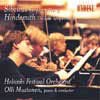Hindemith (The) Four Temperaments; Sibelius Symphony No 3
An unusual pairing of two of this composer-pianist-conductor’s favourite works
View record and artist detailsRecord and Artist Details
Composer or Director: Paul Hindemith, Jean Sibelius
Genre:
Orchestral
Label: Ondine
Magazine Review Date: 6/2003
Media Format: CD or Download
Media Runtime: 52
Mastering:
Stereo
DDD
Catalogue Number: ODE1022-2

Tracks:
| Composition | Artist Credit |
|---|---|
| Symphony No. 3 |
Jean Sibelius, Composer
Helsinki Festival Orchestra Jean Sibelius, Composer Olli Mustonen, Conductor |
| (The) Four Temperaments |
Paul Hindemith, Composer
Helsinki Festival Orchestra Olli Mustonen, Piano Paul Hindemith, Composer |
Author: Guy Rickards
Sibelius’ Third Symphony is a triumph of the power of suggestion. Playable – as here – byrelatively modest forces (deployed generally with restraint) compared to its predecessors, the Third none the less makes a big impact when it needs to and is much greater than the sum of its parts.Mustonen’s interpretation views the piece from adistinctly differentperspective from many previous accounts. Right from the outset, his tempi are swift, achieving the dance-likeimpulsion that some rivals only manage halfway through the opening movement. However, the marking is Allegro moderato, and in shaving a minute or two off Davis or Vänskä, for example, he proceeds too fast; Rattle is closer to the ideal. There’s little to choose between this newcomer and the competition listed above in the variation patchwork of the central span, Mustonen’s orchestra of soloists shown off to fine effect. In the finale, though, his account refuses to take wing and the orchestral balance is infelicitous in places – such as the braying final chord.
To couple this with Nielsen’s Four Temperaments might seem unusual, but Hindemith’s seems positively eccentric at first glance. However, the German is a strong favourite of Mustonen’s, who made a fine recording Ludus tonalis (Decca, 5/96 – nla). Directing from the keyboard, this is a nicely paced account, not outclassed by the main alternatives. The leanness of sound of the Helsinki Festival Orchestra is refreshing, but in the later stages the piano tone becomes harsh and the tuning suffers. However, Ondine’s sound is typically excellent and the relatively close miking gives a slightly more intimate sound than one might expect from an orchestral disc. While neither account can serve as first choice, this issue can safely be recommended to anyone, unfamiliar with either composer’s music, who wants to try them out for the first time.
To couple this with Nielsen’s Four Temperaments might seem unusual, but Hindemith’s seems positively eccentric at first glance. However, the German is a strong favourite of Mustonen’s, who made a fine recording Ludus tonalis (Decca, 5/96 – nla). Directing from the keyboard, this is a nicely paced account, not outclassed by the main alternatives. The leanness of sound of the Helsinki Festival Orchestra is refreshing, but in the later stages the piano tone becomes harsh and the tuning suffers. However, Ondine’s sound is typically excellent and the relatively close miking gives a slightly more intimate sound than one might expect from an orchestral disc. While neither account can serve as first choice, this issue can safely be recommended to anyone, unfamiliar with either composer’s music, who wants to try them out for the first time.
Discover the world's largest classical music catalogue with Presto Music.

Gramophone Digital Club
- Digital Edition
- Digital Archive
- Reviews Database
- Full website access
From £8.75 / month
Subscribe
Gramophone Full Club
- Print Edition
- Digital Edition
- Digital Archive
- Reviews Database
- Full website access
From £11.00 / month
Subscribe
If you are a library, university or other organisation that would be interested in an institutional subscription to Gramophone please click here for further information.




